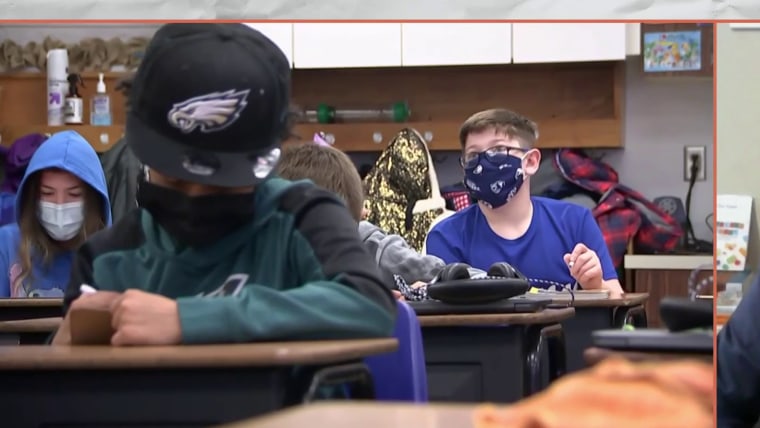The Home handed a invoice Thursday to increase meals help measures for kids, drawing reward from advocates who stated the laws would assist thousands and thousands of children get entry to meals as inflation makes it more and more tough for a lot of mother and father to make ends meet.
It handed the Home in a 376-42 vote. The invoice is awaiting a vote within the Senate.
The bipartisan laws would spare a few of the dozens of kid diet waivers that Congress gave the Agriculture Division the authority to subject. The pandemic-era waivers had been set to run out subsequent Thursday.
However the brand new invoice, titled the Maintain Children Fed Act, wouldn’t prolong essentially the most groundbreaking of the federal waivers: one which made faculty breakfasts and lunches free to all college students no matter their households’ incomes.
Nonetheless, anti-hunger advocates expressed aid that an settlement had been reached. The laws would allow summer season meal program suppliers to function with extra flexibility and assist faculties within the coming tutorial yr as they proceed to deal with provide chain interruptions and labor shortages.
“Although this invoice doesn’t have all the things we had hoped and dreamed, it nonetheless has so much,” stated Lisa Davis, the senior vp of the No Child Hungry marketing campaign at Share Our Power, a nonprofit group working to finish starvation and poverty. “A very powerful factor is they’re offering aid to these households which might be on the sting.”
Crystal FitzSimons, the director of college and out-of-school time applications on the anti-hunger group Meals Analysis and Motion Middle, stated it was “thrilling to have a bipartisan compromise” on little one diet applications.
“It must be a bipartisan subject,” she stated.
Earlier than March 2020, kids in households whose incomes have been at or under 130% of the federal poverty stage have been eligible at no cost faculty meals, whereas these in households whose incomes have been 130% to 185% of the poverty stage have been eligible for reduced-price meals by way of the Agriculture Division’s Nationwide College Lunch Program.
The brand new invoice would get rid of reduced-price meals, permitting those that are eligible to get free meals quite than pay 40 cents for lunch and 30 cents for breakfast. Advocates have pushed for that previously, stated Diane Pratt-Heavner, the spokesperson for the College Vitamin Affiliation, a commerce group representing greater than 50,000 faculty diet staff.
“Though 40 cents for lunch may not sound like so much, you probably have three youngsters and also you’re attempting to get them fed 5 days per week, that may actually add up,” she stated, including that for the 2021-22 faculty yr, a household of 4 would have needed to have earned $34,450 or much less to be eligible at no cost meals or $49,025 or much less to have been eligible for reduced-price meals.
Common faculty meals eliminated the necessity for paperwork to qualify at no cost or reduced-price meals: For the previous two years, all college students merely have been supplied free breakfast and lunch. The adjustment again to filling out functions may come as a shock, or it may not be correctly communicated to households, Davis stated.
“I’m actually fearful about households that is probably not conscious that they’re going to should take an affirmative step for his or her youngsters to get these meals, and there are children throughout the nation that may fall by way of the cracks.”
— Lisa Davis, No Child Hungry
“As we transition again, I’m actually fearful about households that is probably not conscious that they’re going to should take an affirmative step for his or her youngsters to get these meals, and there are children throughout the nation that may fall by way of the cracks,” she stated.
The Maintain Children Fed Act was a last-minute compromise after the extension for the waivers was excluded from the omnibus spending invoice Congress handed this yr. Politico reported that Senate Minority Chief Mitch McConnell of Kentucky and different Republicans opposed extending funding for the varsity meals due to its value, about $11 billion; an aide to McConnell denied that, saying there was by no means a proposal for him to reject.
The Maintain Children Fed Act was launched Tuesday by Sens. Debbie Stabenow, D-Mich., and John Boozman, R-Ark., and Reps. Bobby Scott, D-Va., and Virginia Foxx, R-N.C. It might be paid for by offsets, that means it’s budget-neutral.
“With 90% of our faculties nonetheless going through challenges as they return to regular operations, this may give our faculties and summer season meal applications much-needed help to take care of ongoing meals service points. Congress must act swiftly to move this important assist,” Stabenow stated in a press release Tuesday.
The pliability the measure would prolong for summer season meal program websites can be a lifeline for a lot of households, advocates stated. Among the many issues it could enable for: Websites might proceed to supply grab-and-go meals so mother and father might take a number of meals for his or her kids at one time, versus having to carry their kids forwards and backwards each time to eat meals on web site. There would even be fewer geographical restrictions than there can be if the waivers expire.
“Having summer season meal websites in communities throughout the nation the place households who’re struggling are in a position to simply decide up meals goes to be important to serving to help the family funds, lowering financial stress, lowering the family meals funds,” FitzSimons stated. “Ensuring that these summer season meal websites are accessible all through communities throughout the nation can be a important help to assuaging the stress that so many households are feeling proper now.”

